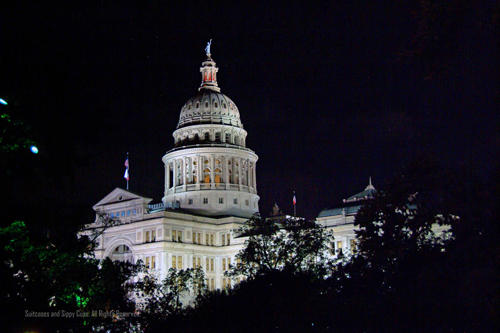 With deadlines fast approaching in the Texas legislative session, Republican leaders are moving ahead with a new package of proposals aimed at reining in the ability of cities and counties to regulate certain employment practices. That includes ordinances mandating private employers to offer paid sick leave.
With deadlines fast approaching in the Texas legislative session, Republican leaders are moving ahead with a new package of proposals aimed at reining in the ability of cities and counties to regulate certain employment practices. That includes ordinances mandating private employers to offer paid sick leave.
During a testy hearing of the Texas House State Affairs Committee last night, Chairman Dade Phelan, R-Beaumont, had several tense exchanges with witnesses who oppose four bills that not only ban the rules on paid sick leave, but would also cancel out requirements for work breaks and end prohibitions on employers asking job applicants about criminal history. Cities that have adopted such ordinances include Austin, San Antonio, and most recently Dallas.
Just before the hearing concluded around midnight, Chairman Phelan introduced a new version of the bill that would bar cities from enacting rules on how businesses schedule their employees’ shifts. At the behest of some business groups, Phelan’s new version includes language that specifically says nondiscrimination ordinances are protected and will stay in place if the legislation becomes law. That bill was voted out of committee and is on its way to the House floor for debate. The other three bills are stalled in the committee for now.
Republican leadership, including Gov. Greg Abbott, has been eyeing the ordinances since they passed.
An original bill, Senate Bill 15, died in the Texas Senate after a last-minute version was unveiled removing language that explicitly protected local nondiscrimination ordinances. The author, Sen. Brandon Creighton, a Republican from Conroe, filed four smaller bills that are basically bite-sized pieces of the original sweeping legislation.
The question of whether these bills would cancel out nondiscrimination ordinances protecting LGBT Texans has been a major sticking point. Creighton insists that the bills do not do that. Attorney General Ken Paxton agrees with him.
In testimony before the Texas Senate State Affairs Committee, the AG's Special Counsel for Civil Litigation David Hacker said the bills "do not preempt local nondiscrimination ordinances."
"The bills tell local municipalities, like cities, that they cannot force employers to provide certain leave and benefits," Hacker said. "But local nondiscrimination ordinances tell employers that if they provide a certain type of leave or benefit, then they cannot discriminate on the basis of certain protected classes. Thus, these bills do not step on the toes of local nondiscrimination ordinances and both can peacefully coexist."
Quorum Report reporter James Russell reported from the House hearing:
Rep. Richard Raymond, a Democrat who is typically more conservative on social issues, announced he planned to ask each witness if they would support or oppose the bill if nondiscrimination protections were added. Some witnesses required more pressure to state an opinion than others.
Justin Braigel, the general counsel for the Texas Hotel and Lodging Association, was easily persuaded. “In our business and the lodging business predictability for our staffing is the most important thing. Our operators are business operators. They operate in multiple jurisdictions across the state,” Braigel said in support of the bills. “The most important thing is being able to from city to city, predictability between regulations such as wages, scheduling, et cetera is crucial.” He added that the group of employers he represents supports the protections for LGBT Texans.
Austin’s Brandon Campbell, who opposes the bills, said the state seems to selectively choose what cities can and cannot regulate.
“I'm a big fan of local freedom normally kind of overrules we pass a lot of local ordinances, and lock people up state doesn't seem to mind any of those, but when it comes down to worker protections, all of a sudden we need to be protected from ourselves,” Campbell said. He said the constant influx of new Austinites undercuts the argument that these regulations are somehow hurting the business environment. “If we can make laws to get people to stop coming to Austin, that'd be a miracle. Everybody's coming to Austin,” he said.
“I would say these ordinances just may do that,” Phelan said, drawing laughter from those in the hearing room.
“Oh, let's give it a try. What are we afraid of? Come on Austin,” Campbell said to cheers from some in the crowd.
At this point, the bill voted out of committee – the one that bars cities from telling employers how to handle scheduling of their workforce – has the best chance of becoming law.
With legislative deadlines looming in the next couple weeks, it’s unclear if the other measures stand a chance. Also, the Senate would have to agree to any changes. That would put Lt. Gov. Dan Patrick, a staunch social conservative, on the spot because it was reportedly his decision in the first place to remove language protecting nondiscrimination ordinances.
By law, the legislative session must come to an end on May 27.


